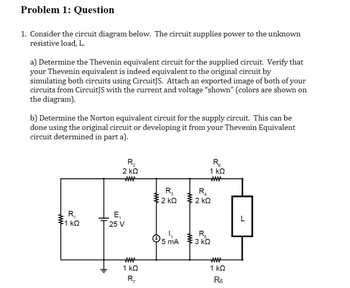
Introductory Circuit Analysis (13th Edition)
13th Edition
ISBN: 9780133923605
Author: Robert L. Boylestad
Publisher: PEARSON
expand_more
expand_more
format_list_bulleted
Concept explainers
Question

Transcribed Image Text:Problem 1: Question
1. Consider the circuit diagram below. The circuit supplies power to the unknown
resistive load, L.
a) Determine the Thevenin equivalent circuit for the supplied circuit. Verify that
your Thevenin equivalent is indeed equivalent to the original circuit by
simulating both circuits using CircuitJS. Attach an exported image of both of your
circuits from CircuitJS with the current and voltage "shown" (colors are shown on
the diagram).
b) Determine the Norton equivalent circuit for the supply circuit. This can be
done using the original circuit or developing it from your Thevenin Equivalent
circuit determined in part a).
R₁
51 ΚΩ
www
R₂
2 ΚΩ
ww
E₁
25 V
1 ΚΩ
R₁₂
R₁
1 ΚΩ
www
R₂
R₂₁
2kQ2KQ
ΚΩ
ΚΩ
5 mA 3 K
ΚΩ
1 ΚΩ
R8
L
Expert Solution
This question has been solved!
Explore an expertly crafted, step-by-step solution for a thorough understanding of key concepts.
Step by stepSolved in 2 steps with 2 images

Knowledge Booster
Learn more about
Need a deep-dive on the concept behind this application? Look no further. Learn more about this topic, electrical-engineering and related others by exploring similar questions and additional content below.Similar questions
- question is belowarrow_forwardCan you be more specific with the calculationsarrow_forward2. In the circuit of Figure below is1 = Vs2=0, Vs1 = 9 V, İs2 = 12 A. For the four cases of (a) R = 0, (b) R=60,(c) R = 90 and (d) R = 10,0000 draw the simplified circuit and find IBA and VAC. Hint: A zero voltage source corresponds to a short-circuited element and a zero current source corresponds to an open-circuited element. İBA B A ww R VS₂ 3 Ω 6Ω U SVarrow_forward
- 1-Rth (in ohm)= 2-IN(Norton current in ampere)=arrow_forwardConsider the following resistor network: i₁ = E A, 1₂ = Voltage gain across I is b. Report the voltage gain across the current source I. (Click on the image to enlarge) Suppose R₁ = 60, R₂ = 50, R3 = 142, R₁ = 4, R5 = 4N, E = 28V and I = 6A. Set up and solve a linear system for the loop currents and the voltage across the current source as shown in the online notes. a. Report the loop currents i1, 12 and i3 (positive for clockwise direction). V R₁ A, 23 = R₂. R3 R4 A R5arrow_forwardElectrical Engineering For the final problem, consider the following circuit diagram: 12 Q 30 V Vx 60 Q 2"Vx B 6) For this circuit, please find and draw: a. The Thevenin equivalent circuit between A and B, using external excitation to find R. b. The Norton cquivalent circuit berween A and B. c. Review section 3-8 from the text. What value load resistor connected between A and B would yield maximum power transfer? How much power woukd this be?arrow_forward
- LO: 1, 2, 4,5,6: Figure shows the resistors from the previous two examples wired in a differentway—a combination of series and parallel. We can consider R1 to be the resistance of wiresleading to R2 and R3. (a) Find the total resistance. (b) What is the IR drop in R1? (c) Find thecurrent I2 through R2. (d) What power is dissipated by R2?arrow_forwardI need part Barrow_forward#2 hello can you find , ir1, ir2 ir3 rt, it ,and pt . Thank you please show me how to do my homeworkarrow_forward
arrow_back_ios
arrow_forward_ios
Recommended textbooks for you
 Introductory Circuit Analysis (13th Edition)Electrical EngineeringISBN:9780133923605Author:Robert L. BoylestadPublisher:PEARSON
Introductory Circuit Analysis (13th Edition)Electrical EngineeringISBN:9780133923605Author:Robert L. BoylestadPublisher:PEARSON Delmar's Standard Textbook Of ElectricityElectrical EngineeringISBN:9781337900348Author:Stephen L. HermanPublisher:Cengage Learning
Delmar's Standard Textbook Of ElectricityElectrical EngineeringISBN:9781337900348Author:Stephen L. HermanPublisher:Cengage Learning Programmable Logic ControllersElectrical EngineeringISBN:9780073373843Author:Frank D. PetruzellaPublisher:McGraw-Hill Education
Programmable Logic ControllersElectrical EngineeringISBN:9780073373843Author:Frank D. PetruzellaPublisher:McGraw-Hill Education Fundamentals of Electric CircuitsElectrical EngineeringISBN:9780078028229Author:Charles K Alexander, Matthew SadikuPublisher:McGraw-Hill Education
Fundamentals of Electric CircuitsElectrical EngineeringISBN:9780078028229Author:Charles K Alexander, Matthew SadikuPublisher:McGraw-Hill Education Electric Circuits. (11th Edition)Electrical EngineeringISBN:9780134746968Author:James W. Nilsson, Susan RiedelPublisher:PEARSON
Electric Circuits. (11th Edition)Electrical EngineeringISBN:9780134746968Author:James W. Nilsson, Susan RiedelPublisher:PEARSON Engineering ElectromagneticsElectrical EngineeringISBN:9780078028151Author:Hayt, William H. (william Hart), Jr, BUCK, John A.Publisher:Mcgraw-hill Education,
Engineering ElectromagneticsElectrical EngineeringISBN:9780078028151Author:Hayt, William H. (william Hart), Jr, BUCK, John A.Publisher:Mcgraw-hill Education,

Introductory Circuit Analysis (13th Edition)
Electrical Engineering
ISBN:9780133923605
Author:Robert L. Boylestad
Publisher:PEARSON

Delmar's Standard Textbook Of Electricity
Electrical Engineering
ISBN:9781337900348
Author:Stephen L. Herman
Publisher:Cengage Learning

Programmable Logic Controllers
Electrical Engineering
ISBN:9780073373843
Author:Frank D. Petruzella
Publisher:McGraw-Hill Education

Fundamentals of Electric Circuits
Electrical Engineering
ISBN:9780078028229
Author:Charles K Alexander, Matthew Sadiku
Publisher:McGraw-Hill Education

Electric Circuits. (11th Edition)
Electrical Engineering
ISBN:9780134746968
Author:James W. Nilsson, Susan Riedel
Publisher:PEARSON

Engineering Electromagnetics
Electrical Engineering
ISBN:9780078028151
Author:Hayt, William H. (william Hart), Jr, BUCK, John A.
Publisher:Mcgraw-hill Education,